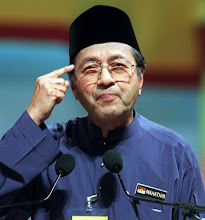 Jst to refresh our memory of Tun Dr M's constribution i wud like to share wit u a posting by Dr Novandri wch remind us of d suspense we face on whr we were heading back den... Thnx Tun Dr.M my statesman i.e Negarawan ku.. may Allh bless u Tun..
Jst to refresh our memory of Tun Dr M's constribution i wud like to share wit u a posting by Dr Novandri wch remind us of d suspense we face on whr we were heading back den... Thnx Tun Dr.M my statesman i.e Negarawan ku.. may Allh bless u Tun..
THE FINANCIAL CRISIS OF 1997 - 1998
By Nor Mohamed Yakcop
 A moment comes
A moment comes, which rarely comes in a lifetime, when a particular event redefines a person’s life and changes the course permanently.
For me, the meeting with Dr. Mahathir Mohamad in Buenos Aires (Argentina) on the evening of October 3, 1997 was such an event.
It enabled me to devote the next 6 years of my life working for Dr. Mahathir Mohamad, meeting him almost daily. In the process, it enabled me to see, at very close range, the abilities of this great man.
The combination of many noble qualities in one person is rare, and it is this unique combination that has enabled Dr. Mahathir Mohamad to transform Malaysia from an otherwise typical third world country into a thriving and vibrant nation, well on the way to become a developed nation.
It is also this combination of qualities that enabled Dr. Mahathir Mohamad to save Malaysia from becoming another IMF nation during the financial crisis of 1997 - 1998.
I am often asked about my involvement in the recovery plan implemented on September 1, 1998.
It began on September 29, 1997, when I received a telephone call from the office of Dr Mahathir Mohamad informing me that the Prime Minister wanted to see me.
The PM was in Cuba at that time, and I asked (in jest) if I was to meet the Prime Minister in Cuba !
I was told (not in jest) that he will be arriving in Buenos Aires on October 3, 1997 and I was to make sure I was in Buenos Aires at least a day before he arrived.
I packed my bags and left for Buenos Aires, and arrived in Buenos Aires on October 2.
The PM arrived the following day at 5 pm and we met immediately at his suite.
He informed me that he had asked many people to explain to him what was causing the financial crisis but no one was able to give him a satisfactory reply.
He asked me whether I could explain to him what exactly was happening.
I asked him how much time he had, and he said two hours.
I explained to him how the forex market works, about short positions and long positions, about hedging and how currencies are borrowed and sold, the difference between “bid” and “offer” and how funds can be transferred from one country to another at the click of a button.
(Dr Novandri : I wonder if the present PM can stand the grill.)
I also explained how the equity market works and the relationship between the forex market and the equity market.
Dr. Mahathir hardly said anything, asked one or two questions, and listened intently.
After two hours, he had to end the meeting to get ready to go for an official dinner.
He asked me about my plans for the night and I said I had been invited for the same dinner.
Dr. Mahathir said to me: You go back to your room and write down all that you have been telling me for the last two hours, and see me at 7 am tomorrow.
I went back to my room, skipped dinner, and wrote it all down, finishing at about 6 am.
I saw him the next morning at 7 am and gave him the report.
He asked me to take a rest and come back again at 2 pm.
When I returned, he told me that he had read the report and that he now understands what was happening in the financial markets.
We started discussing various methods of overcoming the crisis, and our discussions continued when we returned to Malaysia.
I met him almost daily for discussion, sometimes at his house and sometimes at his office.
We tried a few mechanisms to overcome the crisis, some of which worked initially, but the hedge funds were so strong that it was difficult to proceed successfully with these mechanisms.
In early 1998, Dr. Mahathir Mohamad asked me to explore the idea of imposing an exchange control regime to overcome the crisis.
I remember preparing voluminous notes on this subject. Dr. Mahathir went through the notes carefully, and kept asking for more and more details.
We went through many rounds of discussion, until he was finally convinced both with the concept as well as the proposed mechanism. The rest, I guess, is history.
Dr. Mahathir also asked me to prepare a paper on how to put an end to Malaysian shares traded in
CLOB (Central Limit Order Book) in Singapore.
Dr. Mahathir was of the view that an important reason for the falling stock market was the short-selling of Malaysian stocks in CLOB.
I prepared the report and Dr. Mahathir understood, for the first time, how exactly CLOB operates. The report, which was also implemented on September 1, 1998, put to an end the trading of Malaysian shares in CLOB.
I should add that the exchange control measures were crafted in such a way as to minimize the control aspects and maximize the outcome.
The Prime Minister went through the proposed mechanism many times to make sure that the control elements were as few as possible, but adequate enough to ensure a positive outcome.
There were no bureaucratic elements in these measures, such as requiring importers to obtain Bank Negara’s permission to import.
The Ringgit was also pegged at a level where it was not overvalued. In almost every other country, which imposes exchange control measures and pegs its currency, there would, almost by definition, be numerous bureaucratic controls, and the currency would also be pegged at an overvalued rate.
It is often assumed that the system of exchange control (including fixed exchange rate) that we implemented on September 1, 1998 saved the country.
The measures of September 1, 1998 were undoubtedly a necessary condition, but it was not a sufficient condition to overcome the crisis.
Malaysia was saved, not by exchange control measures per se, but by Dr. Mahathir Mohamad.
Let me explain. Any other developing country, facing a similar crisis, if it had introduced the measures that we introduced in September 1998, the measures would probably have failed.
The fact that in Malaysia these measures succeeded is due to the ability and character of Dr. Mahathir Mohamad.
The economy and the financial system, under Dr. Mahathir’s leadership, was in a very healthy state–healthy enough for the exchange control measures to be implemented without negative consequences.
Moreover, the Prime Minister’s hands-on management style enabled quick and timely decisions to be made, which was vital under the new exchange control regime.
Dr. Mahathir, as Prime Minister, had ensured that the Malaysian economy was fundamentally strong. Ringgit was strong and stable.
On the back of the currency stability (at
RM2.50 against the US dollar) Malaysia was doing very well.
At the end of 1996, real
Gross Domestic Product (GDP) grew at almost
8.5 per cent and the growth was expected to continue for many more years.
The government was enjoying a fiscal surplus.
The external debt was low, at
40 per cent of the
Gross National Product (GNP).The current account of the balance of payments had narrowed from a
deficit of 10 per cent to 5 per cent of GNP, and was expected to improve further.
Inflation was at its lowest at
2.1 percent.
We had steady growth of over
8 per cent for a major part of that period.
And this fundamental strength of Malaysia was a critical factor that enabled the exchange control measures to succeed.
For a period of more than a year after the measures of September 1, 1998 were implemented, the Prime Minister met with a small group of us everyday - 6 days a week - for at least 2 hours to go through various economic data, including data on loan growth, exports, imports, property overhang etc.
This enabled the Prime Minister to take quick actions, whenever required. I remember one morning when we were going through the property figures, he looked at me and directed that I should organize a property fair to clear the overhang of properties.
I did, and property worth more than RM 3 billion was sold. Even after the crisis was over, Dr. Mahathir continued to meet with the group regularly, though no longer on a daily basis.
And Dr. Mahathir continued to go through all the economic data with a sharp pencil.
No other Prime Minister in the world, either in developed or developing countries, employs such a hands-on approach in managing the economy.

We can see, therefore, that it was not the exchange control measures per se that saved the country but the man — Dr. Mahathir Mohamad — himself.
The period 1997 - 1998 was, to paraphrase Charles Dickens, the worst of times, but it was also the best of times.
The worst conditions brought out the best in Dr. Mahathir Mohamad.There is a saying that a good leader is like good tea - you only know the true quality when he is in hot water !
Throughout the crisis, the Prime Minister was focussed on resolving the crisis. Day and night, he thought of nothing else but the crisis. He read all he could on finance; he kept asking me to prepare notes on various technical issues.
Sometimes he was sick with bad flu and cough, but he did not take time off to rest. He was convinced that he had to understand the issues before he could work out the solutions.
His native intelligence and ability to focus on core issues were there throughout the crisis. He did not show any sign of fear even at the worst of time, only concern at the fast deteriorating state of the economy.
He was, at all times, confident that he would prevail in the end.
I would like to add two additional points related to the financial crisis.
The first is that, in implementing the measures of September 1, 1998,
Dr. Mahathir not only saved Malaysia but the neighbouring countries as well.
Let me explain.
When Malaysia imposed its exchange control measures on September 1, 1998, the currency speculators realised that the other affected countries (Thailand, Indonesia and South Korea) could also impose similar controls, and they, therefore, stopped their activities in its track.
The speculators backed off. They bought back the currencies that they had sold. This is resulted in the regional currencies appreciating.
Moreover, the International Monetary Fund (IMF) was not happy with what Malaysia had done, particularly since, after implementing the measures, we did exactly the opposite of what the IMF wanted us to do, i.e. we lowered our interest rates and injected liquidity into the system.
The IMF, therefore, started relaxing conditions in other countries and allowed them to lower their interest rates and allowed them to inject liquidity to stimulate their economies so that Malaysia would not outperform the IMF countries.
Therefore, it is no exaggeration to say that Dr. Mahathir Mohamad not only saved Malaysia, but the other affected countries in the region as well - Thailand, Indonesia and South Korea.
My second point is regarding what would have happened if the exchange control measures were not implemented. If the measures were not implemented, many of corporations in Malaysia would have gone under, due to the high interest rates.
When the corporations fall like dominos, banks would have faced severe liquidity and solvency problems due to the ballooning NPLs. The problems of the banks would have resulted in a credit squeeze, which would have led to another round of corporate failures.
The Government’s revenue would have fallen drastically as fewer firms would be paying corporate taxes, thereby reducing the Government’s ability to stimulate the economy through fiscal policy measures.
As a result of the problems faced by corporations and banks, unemployment would have increased substantially, leading to a second round of problems.
This is the classic vicious cycle, which could have, in the end, destroyed the social and political stability of the country.
This was a scenario that was waiting to happen.
It did not happen because of the decisiveness and guts of Dr. Mahathir Mohamad, who decided to take the path less travelled.
We owe Dr. Mahathir much gratitude for what he has done for Malaysia over the last 22 years.Solving the financial crisis of 1997 - 1998 was just one, albeit perhaps the most important, of Dr. Mahathir Mohamad’s many contributions to the nation.
On a personal note, over the last 6 years, I have come to admire this great man for his abilities, his high moral values and, most of all, for his sincerity.
Certainly, a man like Dr. Mahathir Mohamad is not born everyday.
(23rd. October, 2003) 1 komentar:
No doubt Tun's d best leader during his time n to me he is better den LKY of Lion City...heheh..wat can I say..(",)


























I cried when I read this article. How could be we, Malaysian forgot the bless that we had provided by this great Man named Tun Mahathir. We not only forgot all his legacy and good deeds, we also blamed him for our mistakes defending the current leader to continuing support him to be our PM despite our country mismanaged done. We shut our mouth from voicing our rejection to the treatment given to Tun. Wake up Malaysians, let us put Tun back to where he should be.. give back the respect that he deserves as the greatest Statesman while he is still here.
A Malaysian true blue